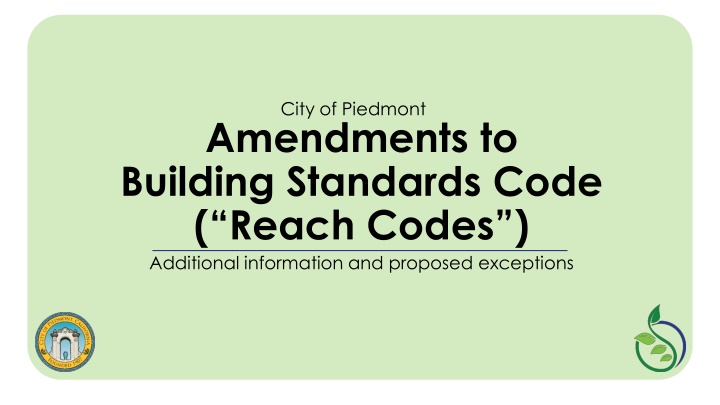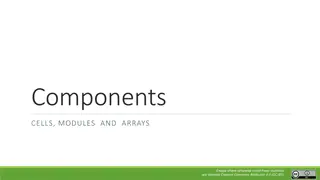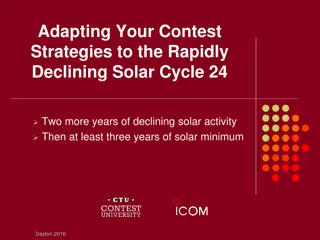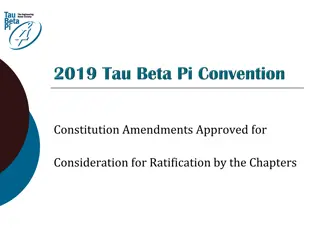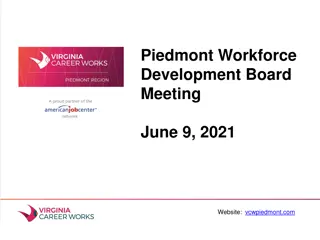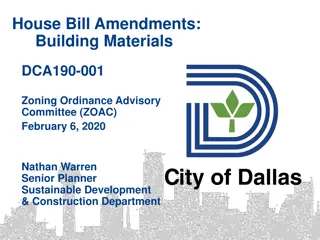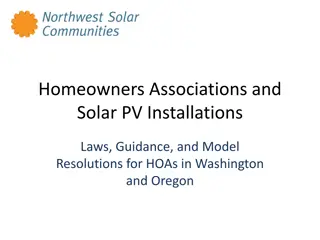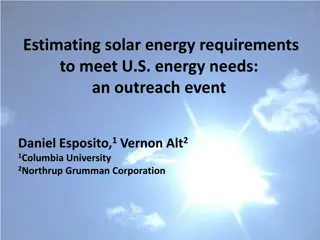Proposed Building Code Amendments and Solar Requirements in City of Piedmont
The City of Piedmont is proposing amendments to the Building Standards Code to reduce natural gas use in buildings and align with Climate Action Plan 2.0 goals. The Reach Codes amendments include new requirements for solar panel installations and electrification. Detailed cost, payback calculations, and exceptions are provided in a staff report to clarify the proposed changes. Key points include mandates for all-electric appliances in low-rise residential buildings, solar panel installations for certain renovations, and exceptions with a Home Energy Score.
Download Presentation

Please find below an Image/Link to download the presentation.
The content on the website is provided AS IS for your information and personal use only. It may not be sold, licensed, or shared on other websites without obtaining consent from the author.If you encounter any issues during the download, it is possible that the publisher has removed the file from their server.
You are allowed to download the files provided on this website for personal or commercial use, subject to the condition that they are used lawfully. All files are the property of their respective owners.
The content on the website is provided AS IS for your information and personal use only. It may not be sold, licensed, or shared on other websites without obtaining consent from the author.
E N D
Presentation Transcript
City of Piedmont Amendments to Building Standards Code ( Reach Codes ) Additional information and proposed exceptions
Background Must reduce natural gas use in buildings to meet Climate Action Plan 2.0 goals Reach Codes local amendments to California Building Standards First reading of Ordinances 750 and 751 N.S. on July 20, 2020 Council asked for clarification before second reading: o Solar panel installation requirement o Renovation installation/electrification requirement o Staff s criteria for granting exceptions to requirement
Requested information Expected upfront cost, payback Exceptions including new amendment Solar requirement: why increase solar panel installation in Piedmont?
Contents Briefly summarize proposed codes Present requested information Proposed new exception Staff report includes: Detailed cost and payback calculations Explanations of exceptions 15 pages of FAQs and answers
Proposed Building Code Amendments
Ordinance 750 (part I) Newly constructed low-rise residential (LRR) buildings, including new detached accessory dwelling units (ADUs), must use all electric appliances LRR buildings getting a new upper level, or increasing total roof area 30% or more, required to install solar panels on the roof LRR building renovations of $25,000 or more required to include one item from a list of insulation/electrification improvements o Renovations of $100,000 or more must include two items New exception will modify certain requirements with a Home Energy Score
Ordinance 750 (part II) An electrical panel upgrade must include capacity to accommodate future electrification of all appliances Kitchen renovation must include electrical outlets at the location of all major appliances Laundry area renovation must include outlet for a future electric clothes dryer Home Energy Score cannot be used as an exemption to these projects
Ordinance 751 Requires submission of a Home Energy Score or Home Energy Audit report (homeowner s choice), completed within the past five years: At point of listing for sale of property, unless the home was constructed within the last 10 years
Solar Installation Code Homes must install solar panels: When building an entire new upper level When increasing total roof area 30% or more Purpose: align Piedmont with state goals for solar panel installation
State goal: increase solar panel installation State wants to: o Green electricity grid o Provide residents with backup power source o Offer residents cost savings on energy Believes solar panel installation will accomplish these tasks Scaling solar PV by requiring it for new construction
Piedmonts situation Very few new residential buildings constructed from scratch State requirement will result in less solar panel installation here (compared to other cities) Proposed code amendment is necessary for Piedmont to install solar panels at the same pace as other cities
Solar Panel cost vs payback Upfront cost: $15,000 to $25,000 Save energy costs Systems usually sized to pay themselves back in 7-10 years Federal Investment Tax Credit: reduce upfront cost ~20%
Other solar financing options Rent solar system for flat rate, get reduced energy costs Power purchase agreement: company owns solar panel, sells you electricity Little to no upfront cost, energy cost savings
Exceptions Houses would be exempt from proposed code, if: Effective annual solar access is restricted to less than 80 square feet by shading from existing permanent natural or manmade barriers external to the dwelling.
Renovation Insulation/Electrification Remodels ($25,000 or more): include one item from a list of insulation or electrification improvements Remodels ($100,000 or more): include two items Consistent with project budget and scope List items: different insulation options, LED lights, or electrifying space or water heating system With Home Energy Score exception, projects don t need to meet this requirement
Cost Any insulation/ electrification improvement will: Increase upfront project costs a few hundred to a few thousand dollars Save residents hundreds of dollars, in energy costs, per year Pay back in 3-10 years Long term: save homeowners money
Example 1: bathroom remodel ($27,000) List item D: Replace incandescent bulbs with LEDs, install motion sensors Increase upfront costs $200 (1% of project costs) Decrease energy bills $240 per year 10 year cost savings: $2,200
Example 1: bathroom remodel ($27,000) List item C: Insulate hot water piping and make sure plumbing fixtures are low-flow Increase upfront costs $1,200 (4% of project costs) Decrease energy bills $165 per year 30 year cost savings: $3,750
Example 2: Extensive renovation of kitchen, bathroom, dining room ($135,000) List item A: Attic insulation and air and duct sealing. Increase upfront costs $2,500 (2% of project costs) Decrease energy bills $250 per year 30 year cost savings: $5,000
Exceptions Circumstances allowing an exception by the Building Official: If the unique features of the construction of the LRR building, including existing heating and/or cooling systems, are not configured for conversion to forced air systems If the installation of the measures is not commensuratewith project s scope and budget, because the cost of those measures would exceed 20% of total project cost or require substantial construction in areas otherwise not part of project A Home Energy Score Report for the LRR building, completed within 5 years, demonstrating that the building already has a minimum Home Energy Score of 7 Modification to only the energy efficiency upgrade requirement
Example of an exception A home already has: Insulated attic, floor, and hot water piping Low-flow fixtures and toilets All LED lights with motion-sensors All simple measures on a Home Energy Score completed The home is getting a $30,000 renovation. The only remaining list items are the (more expensive) heating system replacements under code, home might be required to install an electric heating system. Heating system replacement is not commensurate with project scope and budget, so staff could modify the list requirement.
Next Steps: Second Reading of Ords. 750 and 751 N.S. February 1, 2021 Ordinance 751 N.S. becomes effective March 3, 2021 Ordinance 750 N.S. submitted to CEC, which would: oPost the Reach Codes for 60 days oThen vote whether to approve the Reach Codes oIf approved by CEC, sent to Building Standards Commission
Contacts Kevin Jackson Planning and Building Director kjackson@piedmont.ca.gov Alyssa Dykman Sustainability Program Manager adykman@piedmont.ca.gov Craig Griffin Building Official cgriffin@piedmont.ca.gov Nate Redinbo Climate Action Fellow nredinbo@piedmont.ca.gov
